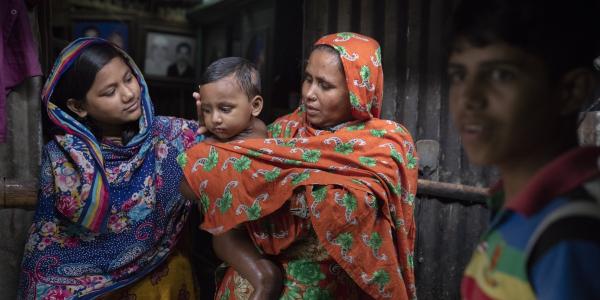Work by economists has implications for climate change adaptation in agriculture
Heat waves, which are projected to become more frequent and intense as the century progresses, could cause as much as 10 times more crop damage than is now projected, a team of researchers led by the University of Colorado Boulder has found.
The researchers’ work, recently published in the Journal of the European Economic Association, analyzed a global dataset spanning 1979 to 2016 and found that agricultural losses were up to an order of magnitude larger than standard approaches predicted.
The team analyzed the data by identifying the length and prevalence of stretches of unusually high heat. Using this method, the team found evidence that successive days of excessive heat seemed to have a cumulatively negative effect beyond what would be expected by examining peak high temperatures alone.
Steve Miller, assistant professor of environmental studies at CU Boulder, is the lead author on the study. His coauthors are economists Jay Coggins and Kenn Chua of the University of Minnesota and Hamid Mohtadi of the University of Wisconsin-Milwaukee.

Steve Miller, assistant professor of environmental studies at CU Boulder.
Miller recently answered four questions about this study and its implications. Those questions and his responses follow:
Question: You and your colleagues find that that agricultural losses from heat waves could be 5-10 times higher than some projections, which are based on mean temperature shifts. Can you describe for the lay person how your team’s approach provides a clearer picture?
Answer: Ultimately, our crops experience a whole series of temperatures throughout any given year, some of which are harmful. When we take an average, we summarize all of those temperatures in a single number.
Doing so loses some potentially important information that might be quite important for crop growth: Were some of the days during the year exceptionally hot? Did those hot days occur in a row as a heat wave, or were they spread out throughout the year?
To get at those questions, we first build an index of prolonged heat stress by pairing daily temperatures with some simple models of how heat stress might accumulate on abnormally hot days and be relieved on cooler days.
Second, using historical data, we examine whether growth in agricultural output declines during years in which that prolonged heat stress index was high more often. Finally, we use that estimated historical relationship together with a suite of climate models to project what future heat waves might mean for agriculture.
To be clear, we build on a lot of prior work (both inside and outside of economics) that seeks to move beyond averages. For example, it's common in economics to examine shifts in distributions of temperatures, which helps us understand the consequence of, say, a day that is 93F instead of 86F.
But that still can't tell us whether having five 93F days in a row is more or less than five times as damaging as a single 93F day. That's what we (and other researchers interested in heat waves) are trying to understand.
Q: You note that heat waves have attracted substantial attention in the popular press but that they’ve attracted less attention in economics literature. To what do you attribute that gap?
A: There are likely a lot of contributing factors. One key factor is that economists like to be able to make causal claims using statistical evidence from non-experimental data, and it’s really hard to do that credibly with rare events like heat waves.
It’s easy for noise to obscure the relationship between heat waves and various outcomes we might care about ... or to suggest spurious relationships!
That's often less of a problem if we want to study something more common like average temperature or even the number of days above 90F. We're getting access to a lot more data these days—over longer time horizons and in more places. That is enabling us to try to pin down the effects of rare events like heat waves.
I think a related factor is that we still have a lot to learn about the economic impacts of temperature changes, even when they come in the form of sporadic hot days. There are a lot of economists and researchers in other fields who are contributing to our knowledge of how heat impacts learning in classrooms, labor, infrastructure and more.
It makes a lot of sense that researchers in this area would continue to build out that knowledge before turning to tackle questions about rare events.
Q: Your team projects scenarios in which climate adaptation, particularly in the realm of agriculture, could reduce the projected losses, but you also note that humans are slow to adapt to rare events, particularly when such adaptation carries uncertain benefits. This might be outside the realm of your discipline, but how could society overcome this kind of obstacle?
A: I think folks in other fields have more informed opinions than I do, but here are some thoughts. There are certainly some possibilities that adaptation to more gradual warming—developing and adopting heat-tolerant varieties of crops, changing crops entirely, making irrigation more effective, etc.—will also have benefits in reducing the impacts of more rare events like heat waves.
Researchers in psychology, behavioral economics and related fields are also studying how people perceive climate risks, who responds to them, how social connections enable or inhibit adaptive behavior, and more.
Their work should help us understand more about options for facilitating adaptation (at CU Boulder, Amanda Carrico is doing some great work in this area).
There's likely also a role for economic incentives. If farmers can insure against disastrous consequences of heat waves, they might perceive changed practices or new technologies as unnecessary. That doesn't mean insurance is bad; we may just want to incentivize adaptation as part of the insurance contracts on offer.
Q: Your article mentions the possibility that micro-level data could reveal whether heat waves or other phenomena have long-lasting or irreversible effects on human health or infrastructure. Is this an area of inquiry you’d like to pursue?
A: Yes. There are a lot of great researchers already studying the effects of heat at a smaller scale, examining health outcomes, educational impacts, labor productivity, and more.
In many cases, extreme heat is quite harmful. I'm curious (and I think my coauthors are too) in which of those settings heat waves have distinct effects on top of those from individual hot days.
It may be that more general adaptations to heat like air conditioning are also effective at eliminating any additional harm from heat waves, but we don't know yet.



